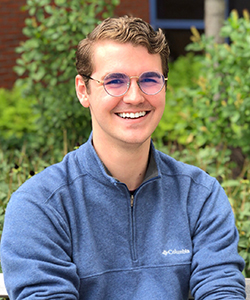Meet Dalton Connolly

Degree: BS Psychology ’19
Research Interests: Neural basis of attention/behavioral deficits associated with schizophrenia
Co-ops:
- Research assistant, PennVet Working Dog Center
- Clinical research coordinator, Hospital of the University of Pennsylvania and Ralston House
Extracurricular activities: Psychology Club, Psi Chi, Maya literary magazine
Tell us a little about yourself.
I’m a senior psychology major here at Drexel. I was originally a biology major, but by the end of my first year, I realized that biology was not what I was passionate about. I am currently in the process of applying to graduate school for a PhD in cognitive neuroscience. I have a big interest in research in that field and I hope to eventually be the principal investigator of my own lab at a university as well as a professor.
Which organizations are you involved in?
I am involved in the Psychology Club, Psi Chi and Maya literary magazine. Maya is the organization that I had the most experience with, and I very much enjoy it. Every week we review art, literature and poetry submissions, and we determine whether or not they should be published in the yearly publication. After reviewing hundreds of submissions, the accepted piece list is then finalized for the publication. We then hold a gala for the release of the book that we worked so hard to put together.
Tell us about your co-op experiences.
Both of my co-op experiences, in research at the University of Pennsylvania, were absolutely fantastic in terms of career development. The first co-op that I did was at PennVet Working Dog Center, where I did behavioral research with working dogs. I worked on two studies. The first was exploring dogs as a means of detection of early-stage ovarian cancer, something that is quite hard to diagnose early. This involved doing work with human blood plasma samples in a biolab, as well as running the dogs through the experiment using a scent wheel that was specifically engineered for this study. Another study that I worked on and helped design was exploring the efficacy of no-reward markers in the training of working dogs.
My second co-op was at the Hospital of the University of Pennsylvania and Ralston House, a geriatric clinic that is a part of the University of Pennsylvania Health System. Here, I worked as a clinical research coordinator on several different studies. For my first study, I helped write the Standard Operating Procedures as well as the Manual of Procedures. This study was exploring mild cognitive impairment resulting from sleep apnea.
The second study that I worked on was a study exploring the use of smartphone technology in order to help relieve insomnia. For this study, I mainly helped with the methods and logistics. I worked on a pilot study that was related to was using electrocorticography (intracranial EEGs) to understand neural activity in patients suffering from severe epilepsy. This included patient recruiting and running the study itself. The final study that I was a part of was also related to mobile smart technology and that was exploring technology acceptance in older adults. I also helped with recruiting as well as the procedure. I even got to administer neuropsychological evaluations (that were, of course, not diagnostic in nature).
What is your favorite thing about being a Drexel student?
My favorite thing about being a Drexel student is the amazing sense of community that exists between my peers, myself and the faculty. Drexel’s ten-week quarters definitely take some getting used to at first, and I really found that this brought my classmates closer together. There is a big emphasis on teamwork and group engagement, which I thoroughly enjoyed. My professors were also outstanding when it came to both the quality of information that they provided as well as the support and encouragement. I want to make it clear that there is zero hand-holding going on; however, there is very much a safety net for academic support should you need to utilize it. The professors are also very fair and accommodating when it comes to grading and assignments.